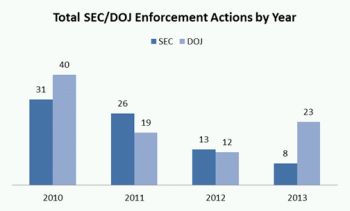- with readers working within the Advertising & Public Relations industries
Foreign Corrupt Practices Act (FCPA) enforcement activity in 2013 was robust, with DOJ and the SEC bringing 31 new FCPA enforcement actions, exceeding 2012's total of 25. Total penalties amounted to more than $720 million, the second highest year on record.

Many trends from earlier years continued in 2013. International cooperation among law enforcement authorities remained strong. For example, 2013 saw the first coordinated enforcement action between U.S. and French authorities in a major foreign bribery case (U.S. v. Total S.A.). DOJ also continued to make good on its promise to prosecute individuals, bringing or announcing 14 actions against individuals in 2013. And, DOJ and the SEC seemed to continue their willingness to reward companies for their swift voluntary disclosure and ongoing cooperation, although the extent of that reward has been the subject of much debate.
There have also been some new developments this year. For example, the SEC entered into its first non-prosecution agreement with a corporate defendant over alleged FCPA misconduct (SEC v. Ralph Lauren Corporation).
Meanwhile, the courts remained busy with FCPA matters. In United States v. Esquenazi et al., the Eleventh Circuit heard oral argument in a challenge to the government's definition of "foreign official." In SEC v. Sharef and SEC v. Straub, the agency faced specific challenges to its expansive interpretation of FCPA jurisdiction, with differing results. Three FCPA-related shareholder derivative lawsuits that commenced in 2011 and 2012 were dismissed in 2013, but the shareholder lawsuit against Wal-Mart was allowed to proceed. And, the Republic of Iraq's lawsuit alleging, inter alia, that numerous multinational corporations violated the FCPA in connection with the U.N.'s Oil-for-Food program was also dismissed.
FCPA legislative reform efforts, on the other hand, seem to have stalled following the issuance of DOJ's and the SEC's FCPA Guidance in November 2012. Although industry groups continue to press DOJ and the SEC for clarity in "several areas of continuing concern for businesses seeking in good faith to comply with the FCPA," the SEC and DOJ have expressed no intention to revisit the Guidance in the near future. However, legislative efforts to strengthen anti-corruption deterrence continue – an amendment is before the House of Representatives that would provide for automatic debarment of companies that have been convicted or charged with a variety of criminal and civil offenses, including violating the FCPA.
Finally, countries other than the United States continue to increase their anti-corruption enforcement. In Russia and Canada, existing anti-corruption regimes were strengthened through legislative action. Brazil enacted the new Clean Companies Act, which is designed to bring it in line with OECD standards and to complement existing anti-corruption laws in the Brazilian Criminal Code by creating criminal liability for individuals, and civil and administrative liability for corporations found guilty of bribery. In China, authorities continue to crack down on bribery and corruption, most notably against pharmaceutical manufacturers.
The content of this article is intended to provide a general guide to the subject matter. Specialist advice should be sought about your specific circumstances.




